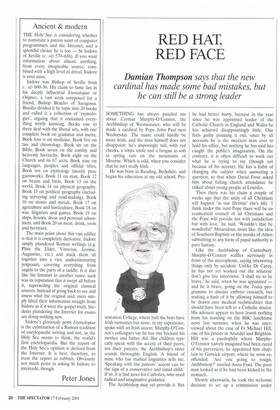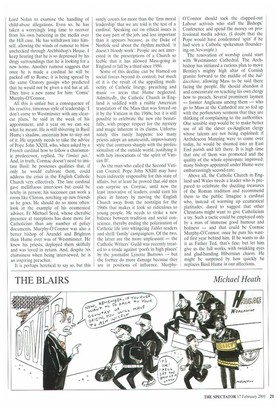RED HAT, RED FACE
Damian Thompson says that the new
cardinal has made some bad mistakes, but he can still be a strong leader
SOMETHING has always puzzled me about Cormac Murphy-O'Connor, the Archbishop of Westminster, who will be made a cardinal by Pope John Paul next Wednesday. The name could hardly be more Irish, and the man himself does not disappoint: he's imposingly tall, with red cheeks, a white smile and a brogue as soft as spring rain on the mountains of Mourne. Which is odd, when you consider that he isn't really Irish.
He was born in Reading, Berkshire, and began his education at my old school, Pre sentation College, where half the boys have Irish surnames but none, in my experience, spoke with an Irish accent. Murphy-O'Connor's colleagues say he has one because his mother and father did. But children typically speak with the accent of their peers, not their parents; the Archbishop's sister sounds thoroughly English. A friend of mine who has studied linguistics tells me, 'Speaking with the parents' accent can be the sign of a conservative and timid child.' If so, it is bad news for Catholics, who need radical and imaginative guidance.
The Archbishop may yet provide it. But he had better hurry, because in the year since he was appointed leader of the Catholic Church in England and Wales he has achieved disappointingly little. One feels guilty pointing it out, since by all accounts he is the sweetest man ever to hold his office, but nothing he has said has caught the public's imagination. On the contrary, it is often difficult to work out what he is trying to say (though not because of his accent). He has a habit of changing the subject when answering a question, so that when David Frost asked him about falling church attendance he talked about young people at Lourdes.
Then there was his claim a couple of weeks ago that the unity of all Christians will happen 'in our lifetime' (he's 68). 'I think under the next Pope there will be an ecumenical council of all Christians and the Pope will preside not with jurisdiction but with love,' he said. 'Wouldn't that be wonderful!' Miraculous, more like: the idea of Southern Baptists or the monks of Athos submitting to any form of papal authority is pure fantasy.
Like the Archbishop of Canterbury, Murphy-O'Connor waffles nervously in front of the microphone, saying interesting things only by accident. Unlike Dr Carey, he has not yet worked out the solution: don't give live interviews. 'I shall try to be brave,' he said, when he was appointed — and he is brave, going on the Today programme to discuss embryo research, but making a hash of it by allowing himself to be drawn into medical technicalities that should have been left to a Catholic doctor. His advisers appear to have learnt nothing from his mauling on the BBC lunchtime news last summer, when he was interviewed about the case of Fr Michael Hill, one of his priests in Arundel and Brighton. Hill was a paedophile whom MurphyO'Connor naively imagined had been cured of his perversion; he appointed him chaplain to Gatwick airport, where he soon reoffended. 'Are you going to resign, Archbishop?' snarled Anna Ford. The poor man looked as if he had been kicked in the stomach.
Shortly afterwards, he took the welcome decision to set up a commission under Lord Nolan to examine the handling of child-abuse allegations. Even so, he has taken a worryingly long time to recover from his own battering in the media over the Hill case. He has withdrawn into himself, allowing the winds of rumour to blow unchecked through Archbishop's House. I keep hearing that he is so depressed by his dingy surroundings that he is looking for a new home. Another rumour suggests that once he is made a cardinal he will be packed off to Rome; it is being spread by the same Oratory gossips who predicted that he would not be given a red hat at all. They have a new name for him: 'Comic' Murphy-O'Connor.
All this is unfair but a consequence of his reactive, timorous style of leadership. 'I don't come to Westminster with any clearcut plans,' he said in the week of his appointment, and a year on we can see what he meant. He is still shivering in Basil Hume's shadow, uncertain how to step out of it. He urgently needs to take the advice of Pope John XXIII, who, when asked by a French cardinal how to follow a charismatic predecessor, replied, We l'anitez pas.' And, in truth, Cormac doesn't need to imitate Basil: he possesses qualities that, if only he would cultivate them, could address the crisis in the English Catholic Church very effectively. The late cardinal gave mellifluous interviews but could be tetchy in person; his successor can work a room like Clinton, notching up new friends as he goes. He should do so more often: look at the example of his ecumenical adviser, Fr Michael Seed, whose cherubic presence at receptions has done more for Catholicism than any number of policy documents. Murphy-O'Connor was also a better bishop of Arundel and Brighton than Hume ever was of Westminster He knew his priests, deployed them skilfully and was loved in return. And, despite his clumsiness when being interviewed, he is an inspiring preacher.
It is perhaps heretical to say so, but this
surely counts for more than the 'firm moral leadership' that we are told is the test of a cardinal. Speaking out on ethical issues is the easy part of the job, and less important than it appears because, as the Duke of Norfolk said about the rhythm method, 'it doesn't bloody work', People are not interested in the prescriptions of a Church so feeble that it has allowed Mass-going in England to fall by a third since 1980.
Some of this decline can be blamed on social forces beyond its control; but much of it is the result of the appalling mediocrity of Catholic liturgy, preaching and music — areas that Hume neglected. Admittedly. the Catholic Church in England is saddled with a risible American translation of the Mass that was forced on it by the Vatican in the 1960s; but it is still possible to celebrate the new rite beautifully, with proper respect for the mystery and magic inherent in its claims. Unfortunately this rarely happens: too many priests adopt an amateurish, improvisatory style that contrasts sharply with the professionalism of the outside world, justifying it with lazy invocations of 'the spirit of Vatican II'.
As the man who called the Second Vatican Council, Pope John XXIII may have been indirectly responsible for this state of affairs, but at least he proved that old men can surprise us. Cormac, until now the least innovative of leaders, could earn his place in history by moving the English Church away from the nostalgia for the 1960s that makes it look so ridiculous to young people. He needs to strike a new balance between tradition and social conscience, thereby ending the polarisation of Catholic life into whingeing Tablet readers and shrill 'family' campaigners. Of the two, the latter are the more unpleasant — the Catholic Writers' Guild was recently treated to a tirade against 'poofs in high places' by the journalist Lynette Burrows — but the former do more damage because they are in positions of influence. Murphy O'Connor should sack the clapped-out Labour activists who staff the Bishops' Conference and spend the money on professional media advice. (I doubt that the Pope would have condemned 'spin' if he had seen a Catholic spokesman floundering on Newsnight.) The renovation of worship could start with Westminster Cathedral. The Archbishop has initiated a curious plan to move Bentley's mighty high altar of Cornish granite forward to the middle of the baldacchino, allowing Mass to be said there facing the people. He should abandon it and concentrate on teaching his own clergy how to preach. Several prominent laymen — former Anglicans among them — who go to Mass at the Cathedral are so fed up with the perfunctory sermons that they are thinking of complaining to the authorities. One sensible step would be to make better use of all the clever ex-Anglican clergy whose talents are not being exploited: if Archdeacon Manning were to come over today, he would be shunted into an East End parish and left there. It is high time that one of them was promoted and the quality of the whole episcopate improved: many bishops appointed under Hume were embarrassingly second-rate.
Above all, the Catholic Church in England and Wales needs a leader who is prepared to celebrate the dazzling treasures of the Roman tradition and recommend them to the public. Imagine a cardinal who, instead of warming up ecumenical platitudes, dared to suggest that other Christians might want to give Catholicism a try. Such a tactic could be employed only by a man of immense good humour and holiness — and that could be Cormac Murphy-O'Connor, once he puts his wasted first year behind him. If he wants to do it as Father Ted, that's fine; but let him give us the full works, with twinkling eyes and glad-handing Hibernian charm. He might be surprised by how quickly he replaces Basil Hume in our affections.
Michael Heath



































































 Previous page
Previous page